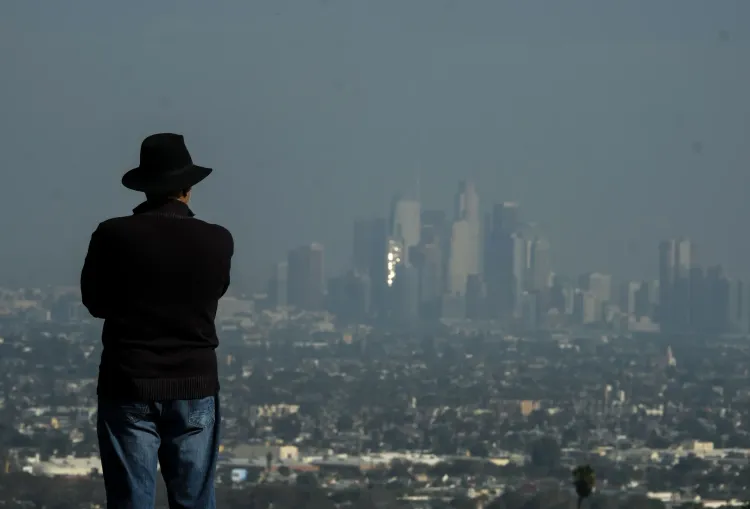Exploitative Landlords Take Advantage of LA Fire Victims

Synopsis
Key Takeaways
- Over 10,000 homes destroyed in LA wildfires.
- Many landlords are exploiting the situation.
- Governor Newsom introduced a 10% rent cap.
- Investigation into price gouging is underway.
- Long-term housing recovery remains uncertain.
Los Angeles, Jan 24 (NationPress) The recent wildfires in the Los Angeles area have wreaked havoc, destroying over 10,000 structures, including numerous homes. Tens of thousands of individuals have been displaced, leading to a fierce competition for housing. Alarmingly, some landlords are taking advantage of this catastrophe.
"It's a shark tank in LA right now with blood in the water," expressed local resident Andrea M. "Everyone is competing for the limited available properties, and unethical landlords are profiting from the suffering of others. It’s disgraceful!"
A rental property in Beverly Hills that was previously listed at $14,000 per month saw an overnight increase of $4,000, while a house in the affluent Bel Air area had its price doubled to $29,500.
Many landlords are viewing this disaster as a lucrative opportunity, with some blatantly defying California’s anti-price gouging laws. Numerous rental listings saw unjustified price hikes, and some were taken down after facing backlash, according to the Xinhua news agency.
Jason Oppenheim, a star on Netflix's popular reality series "Selling Sunset," condemned the "unethical practices" of his colleagues, citing examples where rental prices surged by $10,000 even when a six-month rent payment was offered upfront.
In response to these issues, California Governor Gavin Newsom issued an executive order on January 16 to limit rent increases to 10 percent during the crisis. However, reports indicate that rents in areas like West Los Angeles and Bel Air continue to spike well above this legal cap.
California Attorney General Rob Bonta has initiated investigations into reported incidents of price gouging, encouraging residents to submit evidence for enforcement. Nevertheless, experts point out that prosecuting these cases is intricate and time-consuming, leaving many affected individuals without immediate remedies.
This crisis is particularly severe for renters, who often have fewer resources to recover from disasters compared to homeowners. Analysts caution that the aftermath of the wildfires will worsen the existing housing inequality in the region, disproportionately affecting marginalized or low-income communities.
Researcher Carlos Martin from Harvard criticized disaster relief policies for "favoring property ownership and widening the gap between affluent homeowners and lower-income renters."
While temporary solutions like free housing from nonprofits and discounted hotel stays offer immediate aid, the long-term rebuilding process proves to be significantly more challenging.
Older residents such as Renee and Ed Weitzer, who lost their home in Sunset Mesa and are currently residing in a hotel, have faced difficulties securing new housing despite offering to pay an entire year’s rent upfront. The couple plans to relocate into a family member’s one-bedroom apartment.
Areas like Altadena, which have historically been home to Black communities, are particularly affected.
Local activists are bringing attention to these predatory practices. One organizer has compiled a public spreadsheet documenting properties with inflated prices.
The Los Angeles Tenants Union has identified over 500 listings with sudden rent increases, some exceeding 100 percent. Union members emphasized that even legally permissible rent hikes could further burden renters already struggling in one of the most expensive cities in the nation.
As Los Angeles confronts these pressing challenges, both local and state leaders are advocating for enhanced protections and accountability measures.
County Supervisor Lindsey Horvath stressed the need for displaced residents to receive supportive assurances rather than exploitation. Governor Newsom has proposed $2.5 billion for emergency recovery efforts.
Still, housing advocates remain cautious about the long-term implications. Experts predict a rise in homelessness and extended recovery periods for the affected communities.
"Recovery from disasters often takes years or even decades," stated Jeffrey Schlegelmilch, Director of the National Centre for Disaster Preparedness at Columbia Climate School.
For many residents of Los Angeles, already living on the financial edge, the wildfires may become the tipping point that drives them out of the city, Schlegelmilch added.









